Concrete Mixer
Description
Concrete mixer is a machine that has entirely changed the traditional way of mixing concrete by hand. It is preferred over hand mixing, as it provides an easy and quick mixing of sand or gravel and water needed to produce concrete. Depending on the application, the concrete mixer ranges from large concrete mixing truck to a portable concrete mixers. A portable concrete mixer consists of a motor, a rotating drum, blades. The ingredients of concrete are added in the drum and spun to mix them evenly to form a smooth and soft mixture for forming and applying.
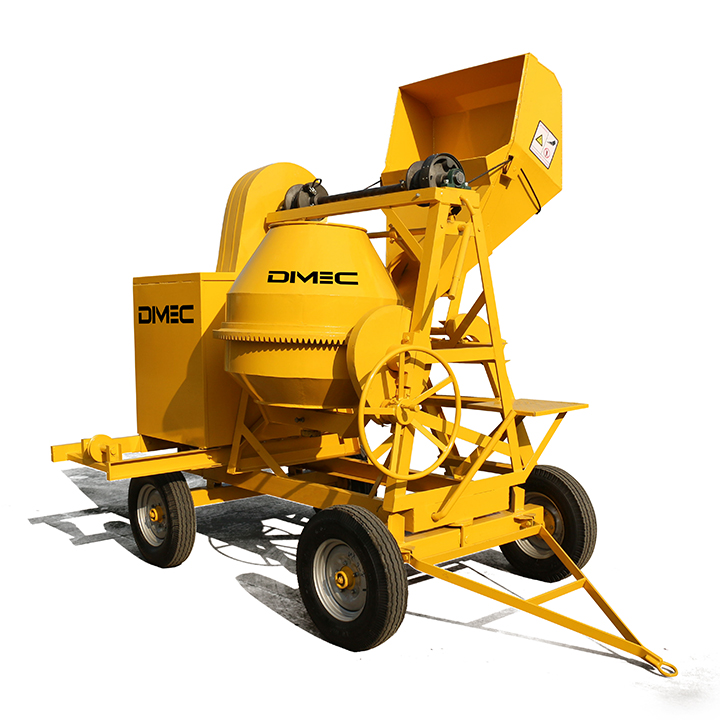
Today, there are electric cement mixers that can be powered by either petrol or diesel engine. The engine can provide powerful energy to keep a continual movement. It is used for preparing concrete by mixing cement, water and sand. The PME-CM350 is bigger mixer with 350L drum capacity. It is more useful for medium jobs. Pick this type of mixer if you need it for projects that require mixing of only few sacks. It will allow you to mix the exact quantity and there will be little or no waste material.
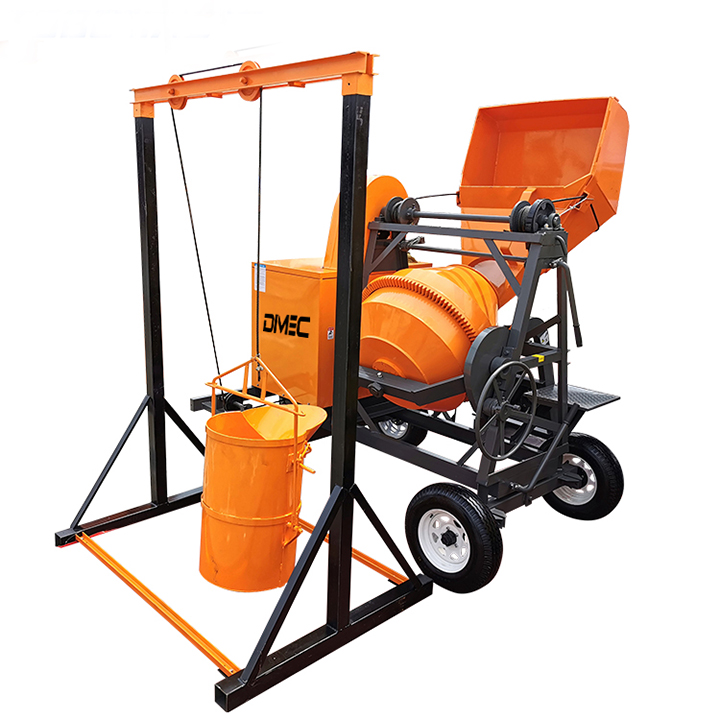
Features
● Easy transportation – The mixer has two or four wheels. You can trail it by your car or truck.
● Durable And Easy For Maintenance – This mixer is powerful enough to complete the job in the right manner. Minor maintenance and proper cleaning routine are required for long lasting usage.
● Easy Usage – The mixer is very easy for usage. The worker starts the motor, the ingredients are mixed and the concrete is poured into a wheelbarrow by pulling the handle of the electric cement mixer. There are no additional instructions on how to use the cement mixer.
● Cost-effective – concrete mixer saves time, money and labour. Therefore, buying an electric cement mixer is definitely a worthy investment.
Product Parameters
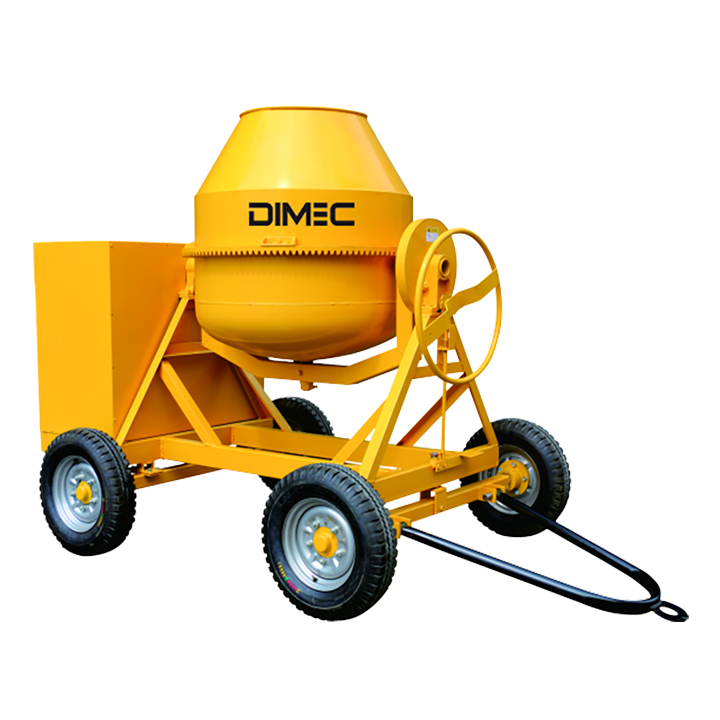
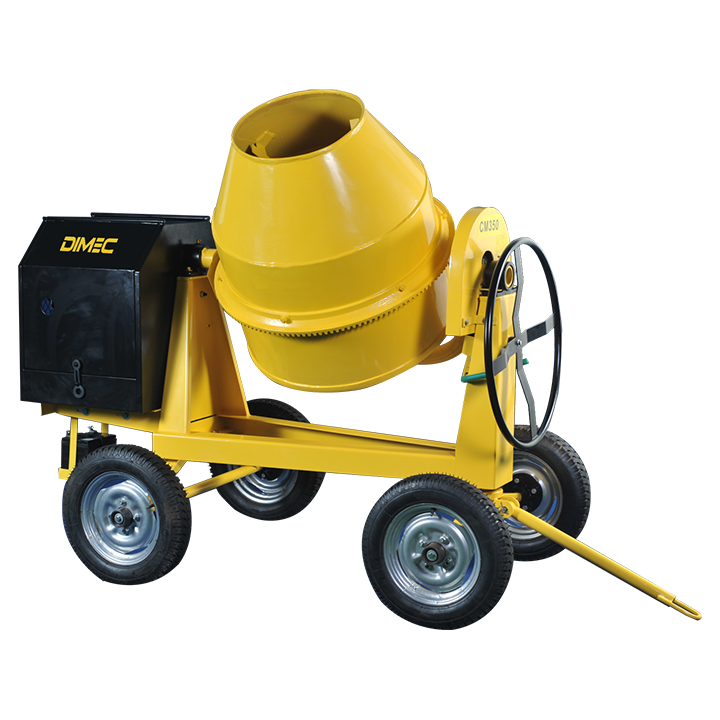
| Model | PME-CM350 | PME-CM400 | PME-CM500 | PME-CM510 | PME-CM700 |
|---|---|---|---|---|---|
| Drum capacity [L] | 350 | 400 | 500 | 510 | 700 |
| Mixing capacity [L] | 280 | 320 | 400 | 350 | 560 |
| Productivity [m3/h] | 4--5 | 5--6 | 6--8 | 20 | 8--10 |
| Bags of cement per batch | 1 bag, 50kg | 1 bag, 50kg | 1.5 bags, 75kg | 1.5 bags, 75kg | 2 bags,100kg |
| Drum rotation speed [rpm] | 25-30 | 25-30 | 20-25 | 20-30 | 20-22 |
| Drum size | φ800x900 mm | φ850x900 mm | φ950x900 mm | 510L | φ950x1050 mm |
| Tyre | 2 x 4.00-12 | 2 x 4.00-12 | 4 x 4.00-12 | 205/75/R14 | 4 x 5.00-12 |
| N.W./G.W. [kg] | 280/300 | 310/330 | 385/405 | 1650/1650 | 620/650 |
| Package size (L x W x H) [cm] | 186x86x110 | 196x96x120 | 206x106x125 | 225x170x200 | 220x106x130 |
Drum thickness [mm]: Upper drum thickness:3mm; lower drum thickness 4mm
Application
Concrete Mixer Advantages
HIGH-PERFORMANCE MOTOR
Equipped with a robust and energy-efficient motor, ensuring smooth operation under heavy loads. Electric, gasoline, or diesel power options available to suit diverse job site needs.
DURABLE MIXING DRUM
Constructed with reinforced steel and anti-corrosion coating, the drum delivers thorough mixing, resists wear, and guarantees long-term reliability in harsh conditions.
ADVANCED MIXING BLADES
Precision-engineered blades optimize material flow, achieving uniform consistency in less time. Heat-treated for enhanced durability and resistance to abrasion.
MOBILE DESIGN
Integrated heavy-duty wheels and a compact frame enable easy transportation between sites. Ergonomic handles and foldable components ensure hassle-free maneuverability.
How Does a Concrete Mixer Work?

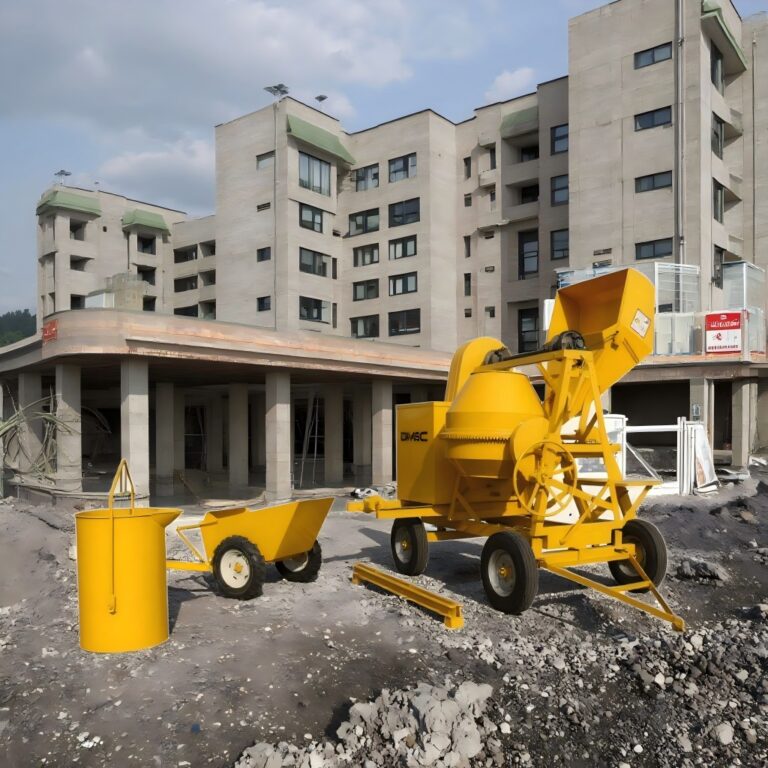
Electric Concrete Mixer
- 1pc lifting bucket
- 1pc wheel barrow
- 1pc pulley bracket
- 60m wire rope
- 25m lifting height
- Electric start, 60AH battery
Benefits of Using Plate Compactors
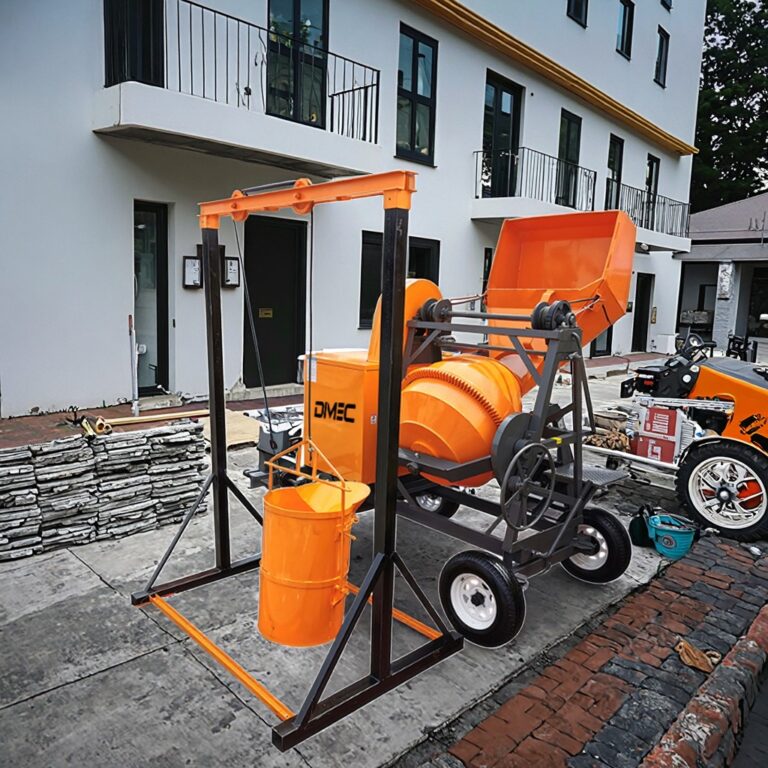
How to Choose the Right Concrete Mixer
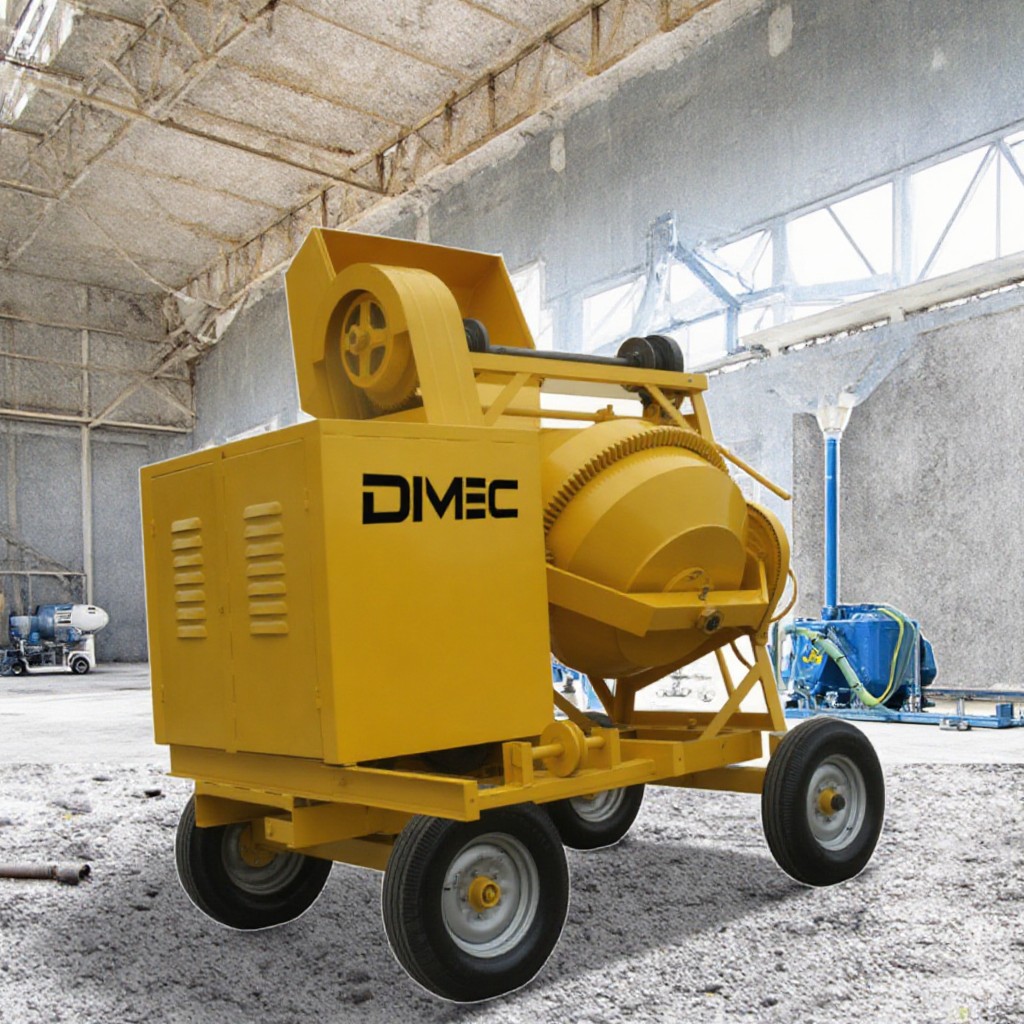
- Follow manufacturer instructions.
- Use the correct mixing ratios.
- Clean the mixer after each use.
- Wear protective gear for safety.
- Regularly inspect and lubricate moving parts.
- Clean the drum thoroughly after each use.
- Check for rust or damage.
- Store in a dry place to prevent corrosion.
Concrete Mixer Maintenance Tips
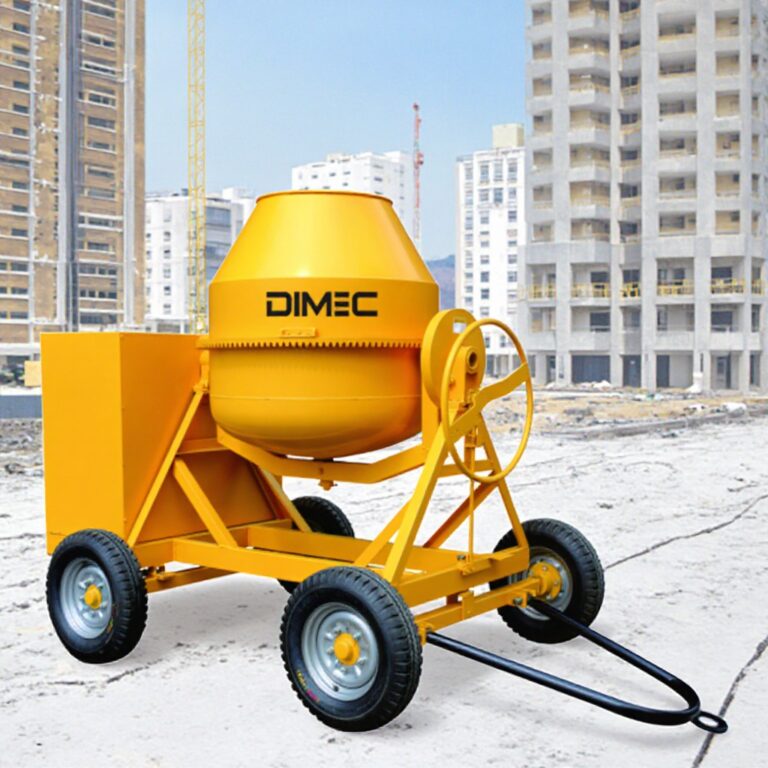
Most mixes require 3 to 5 minutes of mixing for a consistent blend.
Yes, but it requires manual labor and may not yield consistent results.
A typical ratio is 0.4 to 0.6 parts water to 1 part cement, depending on the application.
Rinse with water immediately after use and scrub off any dried concrete with a wire brush.
For one-time projects, renting is cost-effective. For frequent use, purchasing is the better option.
Maintenance
Thoroughly clean the mixer at the end of the working day. Keep it clean.
Once cured, the cement must be removed from the drum.
Do not attempt to clean the accumulated stale concrete trowel, hammer and other tools, as this may cause damage to the concrete mixer.
The drum is cleaned for approximately 2 minutes using a mixture of water and gravel size of about 25 mm. After cleaning unload a mixture of water and gravel and wash drum spray water inside and outside.
Do not pour water on the motor housing and especially the vents.
Remove any foreign matter from the engine casing. Do not use harsh chemicals and liquids to clean the body parts
Engine periodic maintenance schedule
| Each use | First month or 20 hours | Every 3 months or 50 hours | Every 6 months or 100 hours | Every year or 300 hours | ||
|---|---|---|---|---|---|---|
| Engine oil | Check level | √ | ||||
| Change | √ | √ | ||||
| Air cleaner | Check | √ | ||||
| Clean | √(1) | |||||
| Replace | √☆ | |||||
| Sediment Cup | √ | |||||
| Spark plug | Check-Clean | √ | ||||
| Replace | √ | |||||
| Spark arrester(optional parts) | Clean | √ | ||||
| Idle speed | Check-Adjust | √(2) | ||||
| Valve clearance | Check-Adjust | √(2) | ||||
| Fuel tank and strainer | Clean | √(2) | ||||
| Combustion chamber | Clean | After every 300 Hrs. (2) | ||||
| Fuel line | Check | Every 2 years (Replace if necessary) (2) | ||||
☆ Replace the paper element type only.
(1)Service more frequently when used in dusty areas.
(2)These items should be serviced by your servicing dealer unless you have the proper tools and are mechanically proficient. Refer to manual for service procedures.
Performed at every indicated month or operating hour interval, whichever comes first.